
 Innsbruck
Innsbruck
Bergisel
.
Bergisel-Schanze:
| Hill Size: |
HS 128 |
| K-Point: |
120 m |
 Longest jump: Longest jump: |
144.0 m (Jan Hörl  , 2019-11-18) , 2019-11-18) |
  Hill record: Hill record: |
139.0 m (Markus Eisenbichler  , 2022-01-03, WC) , 2022-01-03, WC) |
  Official hill record: Official hill record: |
138.0 m (Michael Hayböck  , 2015-01-04, WC) , 2015-01-04, WC) |
  Hill record: Hill record: |
136.0 m (Adam Małysz  , 2004-09-11, SGP) , 2004-09-11, SGP) |
  Hill record: Hill record: |
136.0 m (Sara Takanashi  , 2022-01-22, COC) , 2022-01-22, COC) |
| Total height: |
130 m |
| Tower height: |
50 m |
| Inrun length: |
90.7 m |
| Inrun angle: |
35° |
| Take-off length: |
6.5 m |
| Take-off angle: |
10.75° |
| Take-off height: |
3.08 m |
| Speed: |
92.88 km/h |
| Ratio h/n: |
0.579 |
| P-Point: |
109 m |
| Landing angle: |
34.5° |
| Hill certificate: |
 |
| Plastic matting: |
yes |
| Conversions: |
2001 |
Bergisel-Schanze:
| Hill Size: |
HS 115 |
| K-Point: |
110 m |
 Longest jump: Longest jump: |
121.0 m (Martin Schmitt  , 1999-01-03, WC) , 1999-01-03, WC) |
  Hill record: Hill record: |
120.5 m (Adam Małysz  , 2001-01-03, WC) , 2001-01-03, WC) |
| Take-off angle: |
11° |
| Landing angle: |
37.8° |
| Plastic matting: |
no |
| Conversions: |
1984 |
| Operating until: |
2001 |
Bergisel-Schanze:
| K-Point: |
106 m |
  Hill record: Hill record: |
107.5 m (Klaus Ostwald  , 1984-01-04, WC) , 1984-01-04, WC) |
| |
107.5 m (Jens Weißflog  , 1984-01-04, WC) , 1984-01-04, WC) |
| Plastic matting: |
no |
| Conversions: |
1974 |
| Operating until: |
1984 |
Bergisel-Schanze:
| K-Point: |
90.5 m |
  Hill record: Hill record: |
99.0 m (Horst Queck  , 1970-01-04, 4H) , 1970-01-04, 4H) |
| Plastic matting: |
no |
| Conversions: |
1962 |
| Operating until: |
1974 |
Bergisel-Schanze:
| K-Point: |
80 m |
  Hill record: Hill record: |
89.5 m (Willi Egger  , 1961-12-30, 4H) , 1961-12-30, 4H) |
  Official hill record: Official hill record: |
84.5 m (Kalevi Kärkinen  , 1961-01-06, 4H) , 1961-01-06, 4H) |
| Conversions: |
1948 |
| Operating until: |
1962 |
Berg-Isel-Schanze:
| K-Point: |
70 m |
 Longest jump: Longest jump: |
82.0 m (Birger Ruud  , 1933-02-12, WSC) , 1933-02-12, WSC) |
  Hill record: Hill record: |
79.5 m (Reidar Andersen  , 1938-01-02) , 1938-01-02) |
  Official hill record: Official hill record: |
76.5 m (Josef Bradl  , 1938-01-02) , 1938-01-02) |
| Tower height: |
16 m |
| Inrun angle: |
35° |
| Landing angle: |
37° |
| Year of construction: |
1932 |
| Operating until: |
1941 |
Berg-Isel-Schanze:
| K-Point: |
60 m |
 Longest jump: Longest jump: |
65.0 m (Walter Glaß  , 1929-02-17) , 1929-02-17) |
  Hill record: Hill record: |
62.0 m (Alf Andersen  , 1929-02-17) , 1929-02-17) |
| |
62.0 m (Rudolf Hrabic  , 1932-03-11) , 1932-03-11) |
| Tower height: |
7 m |
| Inrun length: |
100 m |
| Inrun angle: |
30° |
| Take-off angle: |
13.5° |
| Landing angle: |
37° |
| Year of construction: |
1927 |
| Conversions: |
1928 |
| Operating until: |
1932 |
Berg-Isel-Schanze:
| K-Point: |
50 m |
  Hill record: Hill record: |
47.0 m (Heinrich Mayerl  , 1927-01-23) , 1927-01-23) |
| Inrun length: |
100 m |
| Inrun angle: |
28° |
| Take-off length: |
8 m |
| Take-off angle: |
4° |
| Take-off height: |
3 m |
| Landing angle: |
37° |
| Further jumps: |
K20 |
| Year of construction: |
1926 |
| Operating until: |
1927 |
| Further jumps: |
no |
| Plastic matting: |
yes |
| Spectator capacity: |
22,500 |
| Year of construction: |
1927 |
| Conversions: |
1928, 1932, 1948, 1962, 1975, 1984, 2001, 2024 |
| Status: |
operating |
| Ski club: |
SV Innsbruck-Bergisel, SC Bergisel |
| Coordinates: |
47.247486, 11.399764 ✔ 
 |
to top
History:
The Bergisel ski stadium at Innsbruck became famous by its special design and numerous ski jumping competitions. Its impressive proximity to the city center offers visitors a spectacular panoramic view of the surrounding mountains and the town.
The ski jumping hill underwent a changeful history so far. Already in 1906 the "Ski-Club Innsbruck" was founded and its members competed on several sow jumping hills in the surrounding area of Innsbruck. The first permanent ski jump was set up by SCI at Husslhof in 1908. It already hosted international competitions, but after World War I it had to be abandoned due to the extension of the west train station.
Soon plans to build a new ski jumping hill at Berg Isel were made. However, they could only be realized by 1925-26. On January 23, 1927, the 50-meter hill planned by Ing. Jakob Albert was inaugurated with an attendance of 5000 spectators. Heinrich Mayerl from Gastein set a first hill record of 47 meters. Already in fall 1927 the hill was extended for 9600 Schillings. According to plans by Ing. Albert a 7 meter high and 45 meter long inrun structure was built and soil works were carried out on the landing hill in order to make jumps up to 70 meters possible. Martin Neuner from Partenkirchen set a new record of 53 meters at the re-opening in January 1928. At that time, there was also a junior hill at Bergisel. The Tri-State competition in 1928 was attended by 8,000 spectators. Winner and Olympic champion Alf Andersen set a hill record of 62 m - Walter Glaß fell at 65 m.
For the FIS Races (Ski World Championships) in 1933, Berg-Isel-Schanze was reconstructed again by Ing. Albert in 1932. Also the infrastructure was improved with new paths, stands and cabins. Norway's Sigmund Ruud set up a hill record of 75 meters and his brother Birger even fell at 82 m. In front of 20,000 spectators, Swiss Marcel Reymond became world champion. Up until World War II, usually several competitions were held each season at Bergisel, such as Julius-Moro-Gedächtnisspringen, New Year's jumping and international FIS competitions.
On the occasion of a football youth tournament in 1941, the teams of SV Villingen and SV Innsbruck visited the ramshackle ski jump at Bergisel. Thereby the inrun tower collapsed and caused 4 people dead and several injured. Then the whole ski jumping facility was completely removed.
After World War II, the ski jump was reconstructed in 1947-48 as the most modern hill of Austria with a critical point of 80 meters. It was inaugurated in 1949. Since the founding in 1953, the Bergisel competition has been part of the traditional German-Austrian ski jumpers' resp. Four Hills Tournament.
For the 1964 Winter Olympics, the ski jumping hill was adapted and enlarged to meet the latest regulations and requirements, and supplemented by spectator and organizational facilities (55,000 seats).
Heini Klopfer designed the K90.5 profile. The construction works began in November 1960 and the Tournee competition in December 1962 took place on the modernized hill. Further modernization measures as K95 took place before the 1976 Winter Games, from June to December 1974, for almost 20 million schillings. In 1985, in cooperation with Seefeld, the large hill competitions of the Nordic World Ski Championships were held on the large hill on Bergisel.
For the 50th anniversary of the international Four Hills Tournament in 2002 Bergisel ski stadium should shine in a completely new light. For a total cost of arround 12 million Euro the Bergisel ski jump was completely modernized and reconstructed. Due to a special request of the Innsbruck municipality an international architecture competition was announced and six famous local and foreign architects were invited. The expert jury consentaneously awarded the project proposal of London-based architect firm Zaha Hadid. Beside the futuristic inrun tower and the enlargement of the landing hill profile onto K120, in several construction steps a new lift, floodlights and plastic covering were installed.
Since then also a few summer Grand Prix events were hosted on Bergisel, as well as the Universiade in 2005 and the first ever Youth Olympic Winter Games in 2012, with ski jumping events staged at Seefeld. In December 2012 a new cooling system was integrated into the inrun, in order to fulfill latest standards and requirements of the FIS.
In the spring of 2024, the plastic mattings on the entire landing area were replaced on Bergisel.

to top
| K120 |
 |
2022-01-03: |
139.0 m |
Markus Eisenbichler  |
WC |
| K120 |
 |
2019-11-18: |
144.0 m |
Jan Hörl  |
|
| K120 |
 |
2015-01-04: |
138.0 m |
Michael Hayböck  |
WC |
| K120 |
 |
2015-01-04: |
137.0 m |
Stefan Kraft  |
WC |
| K120 |
 |
2004-09-11: |
136.0 m |
Adam Małysz  |
SGP |
| K120 |
 |
2003-08-31: |
135.0 m |
Veli-Matti Lindström  |
SGP |
| K120 |
 |
2002-09-13: |
135.0 m |
Martin Höllwarth  |
SGP |
| K120 |
 |
2002-01-04: |
134.5 m |
Sven Hannawald  |
WC |
| K120 |
 |
2002-01-03: |
130.5 m |
Valery Kobelev  |
WC |
| K120 |
 |
2002-01-03: |
127.0 m |
Ildar Fatchullin  |
WC |
| K120 |
 |
2002-01-03: |
125.0 m |
Primož Peterka  |
WC |
| K120 |
 |
2002-01-03: |
125.0 m |
Balthasar Schneider  |
WC |
| K120 |
 |
2002-01-03: |
132.5 m |
Sven Hannawald  |
WC |
| K120 |
 |
2002-01-03: |
132.0 m |
Sven Hannawald  |
WC |
| K120 |
 |
2002-01-03: |
132.0 m |
Andreas Widhölzl  |
WC |
| K120 |
 |
2002-01-03: |
131.0 m |
Martin Schmitt  |
WC |
| K120 |
 |
2002-01-03: |
130.0 m |
Michael Uhrmann  |
WC |
| K120 |
 |
2002-01-03: |
130.0 m |
Igor Medved  |
WC |
| K120 |
 |
2002-01-02: |
128.5 m |
Dirk Else  |
COC |
| K120 |
 |
2002-01-02: |
127.5 m |
Michael Neumayer  |
COC |
| K120 |
 |
2002-01-02: |
127.5 m |
Clint Jones  |
COC |
| K110 |
 |
2001-01-03: |
120.5 m |
Adam Małysz  |
WC |
| K110 |
 |
1999-01-03: |
121.0 m |
Martin Schmitt  |
WC |
| K110 |
 |
1997-01-04: |
120.0 m |
Dieter Thoma  |
WC |
| K110 |
 |
1995-01-04: |
117.5 m |
Kazuyoshi Funaki  |
WC |
| K110 |
 |
1995-01-03: |
117.0 m |
Kazuyoshi Funaki  |
WC |
| K110 |
 |
1994-01-04: |
114.5 m |
Andreas Goldberger  |
WC |
| K110 |
 |
1987-01-04: |
112.0 m |
Ernst Vettori  |
WC |
| K110 |
 |
1985-01-04: |
112.0 m |
Pavel Ploc  |
WC |
| K106 |
 |
1984-01-04: |
107.5 m |
Klaus Ostwald  |
WC |
| K106 |
 |
1984-01-04: |
107.5 m |
Jens Weißflog  |
WC |
| K106 |
 |
1980-01-02: |
107.0 m |
Hubert Neuper  |
WC |
| K106 |
 |
1978-01-03: |
106.0 m |
Falko Weißpflog  |
4H |
| K106 |
 |
1976-01-03: |
103.0 m |
Peter Leitner  |
OWG |
| K106 |
 |
1975-01-04: |
100.0 m |
Karl Schnabl  |
4H |
| K106 |
 |
1975-01-04: |
101.0 m |
Hans Millonig  |
4H |
| K106 |
 |
1975-01-04: |
99.0 m |
Karl Schnabl  |
4H |
| K90.5 |
 |
1970-01-04: |
99.0 m |
Horst Queck  |
4H |
| K90.5 |
 |
1970-01-04: |
98.0 m |
Bjørn Wirkola  |
4H |
| K90.5 |
 |
1964-02-09: |
95.5 m |
Veikko Kankkonen  |
OWG |
| K90.5 |
 |
1964-01-05: |
95.5 m |
Józef Przybyła  |
4H |
| K90.5 |
 |
1962-12-30: |
91.5 m |
Toralf Engan  |
4H |
| K80 |
 |
1961-12-30: |
89.5 m |
Willi Egger  |
4H |
| K80 |
 |
1961-01-06: |
84.5 m |
Kalevi Kärkinen  |
4H |
| K80 |
 |
1956-01-06: |
79.5 m |
Koba Zakadse  |
4H |
| K80 |
 |
1956-01-05: |
82.5 m |
Koba Zakadse  |
4H |
| K80 |
 |
1955-01-06: |
79.5 m |
Torbjørn Ruste  |
4H |
| K70 |
 |
1938-01-02: |
80.5 m |
Josef Bradl  |
|
| K70 |
 |
1938-01-02: |
79.5 m |
Reidar Andersen  |
|
| K70 |
 |
1938-01-02: |
79.0 m |
Toni Eisgruber  |
|
| K70 |
 |
1938-01-02: |
76.5 m |
Josef Bradl  |
|
| K70 |
 |
1935-01-13: |
75.0 m |
Josef Bradl  |
|
| K70 |
 |
1933-02-12: |
82.0 m |
Birger Ruud  |
WSC |
| K70 |
 |
1933-02-12: |
81.0 m |
Randmod Sørensen  |
WSC |
| K70 |
 |
1933-02-12: |
75.0 m |
Sigmund Ruud  |
WSC |
| K70 |
 |
1933-02-12: |
74.5 m |
Birger Ruud  |
WSC |
| K70 |
 |
1933-02-11: |
72.5 m |
Gregor Höll  |
WSC |
| K70 |
 |
1933-01-15: |
66.0 m |
Randmod Sørensen  |
|
| K60 |
 |
1932-03-11: |
62.0 m |
Rudolf Hrabic  |
|
| K60 |
 |
1929-02-17: |
65.0 m |
Walter Glaß  |
|
| K60 |
 |
1929-02-17: |
62.0 m |
Alf Andersen  |
|
| K60 |
 |
1928-01-22: |
53.0 m |
Martin Neuner  |
|
| K60 |
 |
1928-01-01: |
53.5 m |
Gustav Lantschner  |
|
| K50 |
 |
1927-01-23: |
47.0 m |
Heinrich Mayerl  |
|
to top
| K120 |
 |
2022-01-22: |
136.0 m |
Sara Takanashi  |
COC |
| K120 |
 |
2022-01-21: |
131.5 m |
Alexandra Kustova  |
COC |
| K120 |
 |
2022-01-21: |
127.5 m |
Irina Avvakumova  |
COC |
| K120 |
 |
2022-01-21: |
127.5 m |
Sara Takanashi  |
COC |
| K120 |
 |
2022-01-21: |
127.5 m |
Jerneja Brecl  |
COC |
to top
| Sa. |
2025-01-04 |
13:30 : |
WC-4H |
K120 |
1. Stefan Kraft  |

|
| Su. |
2024-01-14 |
10:00 : |
COC |
K120 |
1. Robin Pedersen  |

|
| Sa. |
2024-01-13 |
14:00 : |
COC |
K120 |
1. Robin Pedersen  |

|
| Sa. |
2024-01-13 |
09:45 : |
L-COC |
K120 |
1. Hannah Wiegele  |

|
| Fr. |
2024-01-12 |
10:30 : |
L-COC |
K120 |
1. Anežka Indráčková  |

|
| We. |
2024-01-03 |
13:30 : |
WC-4H |
K120 |
1. Jan Hörl  |

|
| We. |
2023-01-04 |
13:30 : |
WC-4H |
K120 |
1. Dawid Kubacki  |

|
| Su. |
2022-01-23 |
10:00 : |
COC |
K120 |
1. Anže Semenič  |

|
| Sa. |
2022-01-22 |
15:00 : |
COC |
K120 |
1. Anže Semenič  |

|
| Sa. |
2022-01-22 |
09:45 : |
L-COC |
K120 |
1. Sara Takanashi  |

|
| Fr. |
2022-01-21 |
10:30 : |
L-COC |
K120 |
1. Sara Takanashi  |

|
| Tu. |
2022-01-04 |
13:30 : |
WC-4H |
K120 |
- cancelled - |

|
| Su. |
2021-10-17 |
10:00 : |
NC-N-AUT |
K120 |
1. Mario Seidl  |

|
| Su. |
2021-10-17 |
10:00 : |
N-AUT |
K120 |
1. Daniel Huber  |

|
| Su. |
2021-10-17 |
10:00 : |
L-N-AUT |
K120 |
1. Eva Pinkelnig  |

|
| Sa. |
2021-01-16 |
13:30 : |
COC |
K120 |
1. Simon Ammann  |

|
| Sa. |
2021-01-16 |
11:00 : |
COC |
K120 |
1. Aleksander Zniszczoł  |

|
| Su. |
2021-01-03 |
13:30 : |
WC-4H |
K120 |
1. Kamil Stoch  |

|
| Sa. |
2020-01-04 |
14:00 : |
WC-4H |
K120 |
1. Marius Lindvik  |

|
| Su. |
2019-10-20 |
10:30 : |
N-AUT |
K120 |
- cancelled - |
| Su. |
2019-10-20 |
10:30 : |
L-N-AUT |
K120 |
- cancelled - |
| Su. |
2019-10-20 |
10:30 : |
NC-N-AUT |
K120 |
- cancelled - |
| Su. |
2019-02-24 |
14:45 : |
WSC-T |
K120 |
1. Germany  |
 
|
| Su. |
2019-02-24 |
10:30 : |
NC-WSC-TS |
K120 |
1. Germany  |
 
|
| Sa. |
2019-02-23 |
14:30 : |
WSC |
K120 |
1. Markus Eisenbichler  |
 
|
| Fr. |
2019-02-22 |
10:30 : |
NC-WSC |
K120 |
1. Eric Frenzel  |
 
|
| Fr. |
2019-01-04 |
14:00 : |
WC-4H |
K120 |
1. Ryōyū Kobayashi  |

|
| Th. |
2018-01-04 |
14:00 : |
WC-4H |
K120 |
1. Kamil Stoch  |
 
|
| We. |
2017-01-04 |
14:00 : |
WC-4H |
K120 |
1. Daniel André Tande  |

|
| Su. |
2016-01-03 |
14:00 : |
WC-4H |
K120 |
1. Peter Prevc  |

|
| Su. |
2015-01-04 |
14:00 : |
WC-4H |
K120 |
1. Richard Freitag  |

|
| Sa. |
2014-01-04 |
14:00 : |
WC-4H |
K120 |
1. Anssi Koivuranta  |

|
| Su. |
2013-10-06 |
: |
N-AUT |
K120 |
1. Andreas Kofler  |
| Fr. |
2013-01-04 |
13:45 : |
WC-4H |
K120 |
1. Gregor Schlierenzauer  |

|
| We. |
2012-01-04 |
13:45 : |
WC-4H |
K120 |
1. Andreas Kofler  |

|
| Mo. |
2011-01-03 |
13:45 : |
WC-4H |
K120 |
1. Thomas Morgenstern  |

|
| Su. |
2010-01-03 |
: |
WC-4H |
K120 |
1. Gregor Schlierenzauer  |

|
| Su. |
2009-01-04 |
: |
WC-4H |
K120 |
1. Wolfgang Loitzl  |

|
| Th. |
2007-01-04 |
: |
WC-4H |
K120 |
1. Anders Jacobsen  |

|
| We. |
2006-01-04 |
: |
WC-4H |
K120 |
1. Lars Bystøl  |

|
| We. |
2005-01-19 |
: |
UNI |
K120 |
1. Manuel Fettner  |

|
| Mo. |
2005-01-03 |
: |
WC-4H |
K120 |
1. Janne Ahonen  |

|
| Su. |
2004-09-12 |
: |
SGP |
K120 |
1. Daniel Forfang  |

|
| Su. |
2004-01-04 |
: |
WC-4H |
K120 |
1. Peter Zonta  |

|
| Su. |
2003-08-31 |
: |
SGP |
K120 |
1. Maximilian Mechler  |

|
| Sa. |
2003-01-04 |
: |
WC-4H |
K120 |
1. Janne Ahonen  |

|
| Sa. |
2002-09-14 |
: |
SGP |
K120 |
1. Martin Höllwarth  |

|
| Fr. |
2002-01-04 |
: |
WC-4H |
K120 |
1. Sven Hannawald  |

|
| We. |
2002-01-02 |
: |
COC |
K120 |
1. Clint Jones  |

|
| Th. |
2001-01-04 |
: |
WC-4H |
K110 |
1. Adam Małysz  |

|
| Tu. |
2001-01-02 |
: |
COC |
K110 |
1. Manuel Fettner  |

|
| Mo. |
2000-01-03 |
: |
WC-4H |
K110 |
1. Andreas Widhölzl  |

|
| Sa. |
2000-01-01 |
: |
COC |
K110 |
1. Reinhard Schwarzenberger  |

|
| Su. |
1999-01-03 |
: |
WC-4H |
K110 |
1. Noriaki Kasai  |

|
| Su. |
1998-01-04 |
: |
WC-4H |
K110 |
1. Kazuyoshi Funaki  |

|
| Sa. |
1997-01-04 |
: |
WC-4H |
K110 |
1. Kazuyoshi Funaki  |

|
| Th. |
1996-01-04 |
: |
WC-4H |
K110 |
1. Andreas Goldberger  |

|
| We. |
1995-01-04 |
: |
WC-4H |
K110 |
1. Kazuyoshi Funaki  |

|
| Tu. |
1994-01-04 |
: |
WC-4H |
K110 |
1. Andreas Goldberger  |

|
| Su. |
1993-01-03 |
: |
WC-4H |
K110 |
1. Andreas Goldberger  |

|
| Sa. |
1992-01-04 |
: |
WC-4H |
K110 |
1. Toni Nieminen  |

|
| Fr. |
1991-01-04 |
: |
WC-4H |
K110 |
1. Ari-Pekka Nikkola  |

|
| Th. |
1990-01-04 |
: |
WC-4H |
K110 |
1. Ari-Pekka Nikkola  |

|
| We. |
1989-01-04 |
: |
WC-4H |
K110 |
1. Jan Boklöv  |

|
| Su. |
1988-01-03 |
: |
WC-4H |
K110 |
1. Matti Nykänen  |

|
| Su. |
1987-01-04 |
: |
WC-4H |
K110 |
1. Primož Ulaga  |

|
| Sa. |
1986-01-04 |
: |
WC-4H |
K110 |
1. Jari Puikkonen  |

|
| Tu. |
1985-01-22 |
: |
WSC-T |
K110 |
1. Finland  |

|
| Su. |
1985-01-20 |
: |
WSC |
K110 |
1. Per Bergerud  |

|
| Fr. |
1985-01-04 |
: |
WC-4H |
K110 |
1. Matti Nykänen  |

|
| We. |
1984-01-04 |
: |
WC-4H |
K106 |
1. Jens Weißflog  |

|
| Tu. |
1983-01-04 |
: |
WC-4H |
K106 |
1. Matti Nykänen  |

|
| Su. |
1982-01-03 |
: |
WC-4H |
K106 |
1. Manfred Deckert  |

|
| Su. |
1981-01-04 |
: |
WC-4H |
K106 |
1. Jari Puikkonen  |

|
| Fr. |
1980-01-04 |
: |
WC-4H |
K106 |
1. Hubert Neuper  |

|
| Th. |
1979-01-04 |
: |
4H |
K106 |
1. Pentti Kokkonen  |

|
| We. |
1978-01-04 |
: |
4H |
K106 |
1. Per Bergerud  |

|
| Tu. |
1977-01-04 |
: |
4H |
K106 |
1. Henry Glaß  |

|
| Su. |
1976-02-15 |
: |
OWG |
K106 |
1. Karl Schnabl  |

|
| Su. |
1976-01-04 |
: |
4H |
K106 |
1. Jochen Danneberg  |

|
| Fr. |
1975-01-03 |
: |
4H |
K90.5 |
1. Karl Schnabl  |

|
| Th. |
1974-01-03 |
: |
4H |
K90.5 |
1. Hans-Georg Aschenbach  |

|
| We. |
1973-01-03 |
: |
4H |
K90.5 |
1. Sergej Botchkov  |

|
| We. |
1971-12-29 |
: |
4H |
K90.5 |
1. Yukio Kasaya  |

|
| Su. |
1971-01-03 |
: |
4H |
K90.5 |
1. Zbyněk Hubač  |

|
| Su. |
1970-01-04 |
: |
4H |
K90.5 |
1. Bjørn Wirkola  |

|
| Sa. |
1969-01-04 |
: |
4H |
K90.5 |
1. Bjørn Wirkola  |

|
| Sa. |
1968-01-06 |
: |
4H |
K90.5 |
1. Gari Napalkov  |

|
|
1968 |
: |
UNI |
K90.5 |
1. Hiroshi Itagaki  |
|
1968 |
: |
NC-UNI |
K90.5 |
1. Hiroshi Itagaki  |
| Fr. |
1967-01-06 |
: |
4H |
K90.5 |
1. Bjørn Wirkola  |

|
| Su. |
1966-01-02 |
: |
4H |
K90.5 |
1. Dieter Neuendorf  |

|
| Su. |
1965-01-03 |
: |
4H |
K90.5 |
1. Torgeir Brandtzæg  |

|
| We. |
1964-01-29 |
: |
OWG |
K90.5 |
1. Toralf Engan  |

|
| Su. |
1964-01-05 |
: |
4H |
K90.5 |
1. Veikko Kankkonen  |

|
| Su. |
1962-12-30 |
: |
4H |
K90.5 |
1. Toralf Engan  |

|
| Sa. |
1961-12-30 |
: |
4H |
K90.5 |
1. Willi Egger  |
 
|
| Fr. |
1961-01-06 |
: |
4H |
K90.5 |
1. Kalevi Kärkinen  |
 
|
| Su. |
1960-01-03 |
: |
4H |
K90.5 |
1. Max Bolkart  |
 
|
| Su. |
1959-01-04 |
: |
4H |
K90.5 |
1. Helmut Recknagel  |
 
|
| Su. |
1958-01-05 |
: |
4H |
K90.5 |
1. Helmut Recknagel  |
 
|
| Su. |
1956-12-30 |
: |
4H |
K90.5 |
1. Nikolaj Sjamov  |
 
|
| Fr. |
1956-01-06 |
: |
4H |
K90.5 |
1. Koba Zakadse  |
 
|
| Th. |
1955-01-06 |
: |
4H |
K90.5 |
1. Torbjørn Ruste  |
 
|
| Su. |
1954-01-03 |
: |
4H |
K90.5 |
1. Olaf Bjørnstad  |
 
|
| Tu. |
1953-01-06 |
: |
4H |
K90.5 |
1. Erling Kroken  |
 
|
| We. |
1933-02-08 |
: |
WSC |
K70 |
1. Marcel Reymond  |

|
| Sa. |
1933-02-04 |
: |
NC-WSC |
K70 |
1. Sven Eriksson  |

|
to top
to top
Innsbruck, the capital of the Austrian state of Tyrol, is located in the Inn Valley, at the intersection of two important traffic axes: the Arlberg and Brenner Pass passes. The city is an important trading center and a popular holiday resort for winter sports enthusiasts and mountaineers. The Winter Olympics took place here in 1964 and 1976. In addition to tourism, metal and food processing as well as the production of textiles also play an important role. Innsbruck is the seat of the state authorities, the higher regional court and a Catholic bishop. Where the suburb of Wilten is today was once the Roman stage station of Veldidena. The Inn terraces were already populated in the Bronze Age. The location of today's city was determined by the Bavarian Counts of Andechs at the end of the 12th century when they founded a market on the northern bank of the Inn. In the middle of the 13th century, Innsbruck came to Tyrol and thus to the Habsburgs. When the Tyrolean line of the Habsburgs ended in 1665, the city lost its function as a residential city. Between 1806 and 1814 the city belonged to Bavaria. One of the most famous sights is the Neuhof, built in the 15th century, with its famous bay window, the Golden Roof. Other well-known buildings include the Hofkirche from the 16th century with the tomb of Maximilian I, the baroque parish church of St. Jacob from the 18th century, the Leopold Franzens University founded in 1669 and several aristocratic palaces from the 17th and 18th centuries.
to top
to top
to top
to top
to top
Advertisement:
to top
Comments:
to top
Social Bookmarks




 Innsbruck
Innsbruck
 Hill records K120 (Men):
Hill records K120 (Men): Hill records K120 (Women):
Hill records K120 (Women): Competitions:
Competitions: Contact:
Contact: Town:
Town: Links:
Links: Map:
Map: Photo gallery:
Photo gallery: Videos:
Videos: Articles:
Articles:



 Retje
Retje Wippra
Wippra Kalliolahti
Kalliolahti Păltiniș
Păltiniș  Højbjerg
Højbjerg Stephenson
Stephenson  Ifrane
Ifrane Flesberg
Flesberg  Töcksfors
Töcksfors 







 Longest jump:
Longest jump: Hill record:
Hill record: Hill record:
Hill record: , 2004-09-11, SGP)
, 2004-09-11, SGP)
 , 2022-01-22, COC)
, 2022-01-22, COC)
 , 1984-01-04, WC)
, 1984-01-04, WC)




















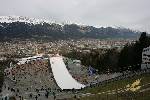
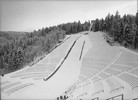
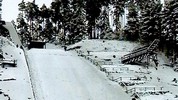




















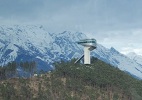
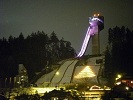



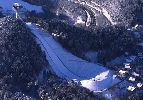

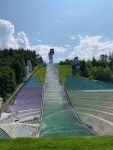
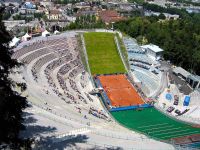

























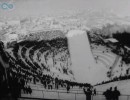





















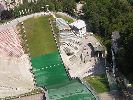




































































































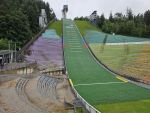








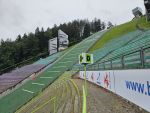




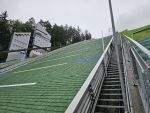

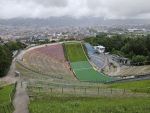






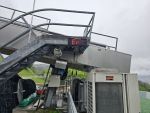



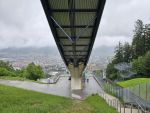




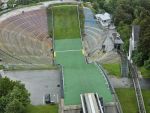











Post comment:
Sara 136
136 m müsste wohl als Damenrekord eingetragen werden, oder?
New HS
HS128 right now. Please, check this information.
Antworten auf Fragen
Hier sind Antworten auf unten gestellte Fragen.
ad 3) und 7)
Im Bergiselstadion darf keine Flutlichtanlage errichtet werden, nicht weil es die Verantwortlichen nicht möchten, sondern weil sich die Anrainer entgegenstellen.
ad 6)
Die zugelassene Zuschauerzahl wurde nach dem Unglück beim "Air and Style" am 4.12.1999, bei dem nach einer Massenpanik 5 Tote und 4 schwer Verletzte gegeben hat, drastisch reduziert. In folge dessen wurden auch viele Zuschauerplätze rechts und links vom Aufsprunghügel zurück gebaut.
siehe auch http://www.nachrichten.at/oberoesterreich/4-12-1999-Panik-am-Bergisel;art4,434544
The 2017 4 hills competition at Innsbruck was spoiled by the lack of floodlighting, making it impossible to extend the competition beyond sunset, leading to the cancellation of the second round. It is an irony that that the ski jump is an architectural masterpiece, but is severely limited by the lack of floodlighting. I think this is a great pity, because from a TV exposure point of view, the ability to hold evening events would greatly enhance the standing of this famous ski jumping facility.
zuseherzahl
warum ist die zugelassene zuseherzahl so drastisch gesunken? bei olympia 76 waren noch knapp 60.000 im bergiselstadion, oder?
Der Schanzenrekord hält im Winter nicht Stefan Kraft (AUT), sondern sein Landsmann Michael Hayböck, aufgestellt am 04.01.2015 mit 138,0 m. Quelle: http://medias2.fis-ski.com/pdf/2017/JP/3865/2017JP3865RL.pdf (in der Datei rechts WC Hill Record)
Klubowa skocznia Gregora Schlierenzauera, Andreasa Koflera, Manuela Fettnera, Manuela Poppingera i Mario Innauera.
Flutlichtanlage ???
Ich bin ein wirklich begeisterter Fan vom Skispringen, verfolge jeden Weltcup im Fernsehen, aber dass, was ich beim 3. Springen der Vierschanzentournee in Innsbruck am Bergisel im Kommentar von Dirk Thiele auf Eurosport erfuhr, macht mich ernsthaft sehr nachdenklich !
Er berichtete, dass das Springen auf jeden Fall vor Einbruch der Dunkelheit beendet sein muss, da die Schanze in Innsbruck keine Flutlichtanlage zur Verfügung hat !
Aber... Weltcupaustragungsorte wie Willingen z.B. erhielten von der FIS die Auflage, eine feste Flutlichtanlage zu installieren. Wenn nicht, wird der Weltcup für Willingen gestrichen !
Und nur, weil in Innsbruck ein Springen der Vierschanzentournee ausgetragen wird braucht der Veranstalter einfach keine Flutlichtanlage zu installieren ? Warum nicht gleiches Recht für alle ?
Ich persönlich empfinde dies als sehr unfair von der FIS, denn die Vierschanzetournee zählt offiziell zum Weltcup, genau so wie auch all die anderen Austragungsorte auf der Welt. Und die MÜSSEN sich an die Auflagen der FIS halten und Innsbruck sollte das auch ! Dafür habe ich einfach kein Verständnis, tut mir leid. Jeder Austragungsort MUSS die Richtlinien der FIS erfüllen. AUCH am Bergisel. So einfach ist das !
Fairness wird so groß geschrieben im Sport. Und das bitte soll Fairness sein ?
Schanzenrekord
Müsste der Schanzenrekord nicht die 137m von Stefan Kraft sein? Hayböck ist doch gestürtzt (in den Schnee gegriffen...)???